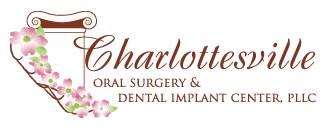18 Jul How do I know if my tooth is impacted?
An impacted tooth is no laughing matter. Impacted teeth can inflict damage to neighboring teeth, lead to infection, or damage the jaw bone. Most often, impacted teeth are not likely to move into the proper positions, leading to a recommendation for extraction. If you suspect that you may have an impacted tooth, it is important to be evaluated by an oral surgeon immediately. As you make plans for your consultation regarding an impacted tooth in Charlottesville, some general knowledge about the condition may be helpful.
Wisdom teeth are the most commonly observed impacted teeth. Due to their position in the furthest corners of the mouth, there is generally less space for these teeth to erupt properly. It is not uncommon, though, for other teeth to become impacted. Often, permanent teeth can fail to erupt if a baby tooth is not lost or removed. In this case, the primary tooth is retained into adulthood and the permanent tooth is impacted in the jaw bone.
When a tooth is completely encased in the jaw bone, it is said to be a bony impaction. The tooth does not push through the bone, and can cause a cyst to develop. In other cases, the tooth is trapped at an undesirable angle within the bone. When trapped against the roots of neighboring teeth, this type of bony impaction can lead to pressure, crowding, and even pain.
Sometimes, a tooth has broken through the jawbone, but has not erupted through the gum tissue. If the tooth is completely encased in the gum tissue, it is referred to as a soft tissue impaction. When the tooth has broken the gum tissue, but cannot completely grow into its proper position, it is identified as a partial impaction. This scenario can be especially troublesome since bacteria and food debris can become trapped under the gum tissue, while it is nearly impossible to clean the area. A resulting gum infection is probable and often, decay can develop on the teeth as well.
The only true way to identify an impacted tooth is through the use of x-rays and a dental exam. If you suspect that you may have an impacted tooth, call 434-295-0911 to schedule an appointment with our oral surgeon today.
